Floating Homes: The Future of Living
People are finding that floating homes are a creative and popular way to live, especially in places where land is expensive or hard to come by. Unlike houseboats, floating homes are fixed buildings that are built on platforms that float in the water. They usually have all the same features as regular homes. They offer a unique way to live by mixing the conveniences of a regular house with the beauty and peace of living on the water.
Table of contents
- Why Choose a Floating Home?
- The Practicality of Floating Homes
- Sustainability and Floating Homes
- The Challenges of Living in a Floating Home
- A Look at Floating Home Communities
- Comparing Floating Homes to Traditional Homes
- Are Floating Homes Safe?
- Are Floating Homes a Good Investment?
- Are Floating Homes Legal in Ontario?
- Are Floating Homes Expensive?
- How Are Floating Homes Built?
- What Are Floating Homes Made Of?
- Can Floating Homes Be Moved?
- Do Floating Homes Pay Property Taxes?
- Final Thought
Why Choose a Floating Home?
Floating homes are appealing because of their unique position and way of life. Imagine waking up to the sound of water splashing against your house and having beautiful views of the water all around you. Away from the noise and chaos of city life, floating houses offer a peaceful and natural setting. Plus, they’re usually in small, friendly towns that make people feel like they belong to the same group.
A unique way to connect with nature is to live in a floating home. Because they can see the changes in the weather and water up close, residents often say they care more about the environment. It’s more than just a place to live; it’s a way of life that gets you closer to nature.
Floating houses have also become a sign of wealth and privilege. Some very expensive floating homes have cutting edge technology and high-end features that are on par with the most expensive standard houses. What if you could have a smart home system, top-notch security, and high-end finishes while moving on water?
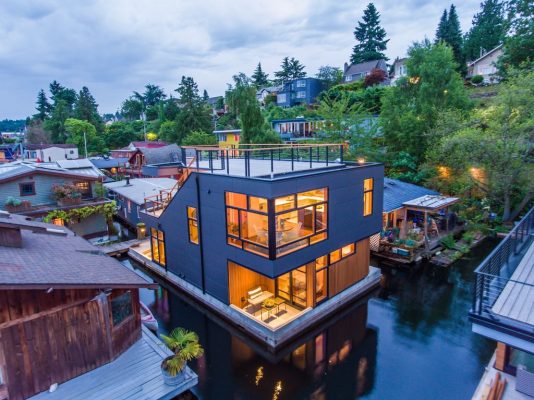
The Practicality of Floating Homes
Having a floating home isn’t just a nice thing to look at; it can also be useful in some situations. Floating houses, which can rise and fall with the water levels and lower the risk of flood damage, can be a smart choice in places that are likely to flood. These homes are also a good choice for places that don’t have a lot of land because they use water spaces for living.
Floating home investments can be profitable from a financial standpoint. Due to their uniqueness and restricted supply, they go up in value in some places. Also, based on where you live and the fees that come with it, living on the water can sometimes be cheaper than living in a regular house.
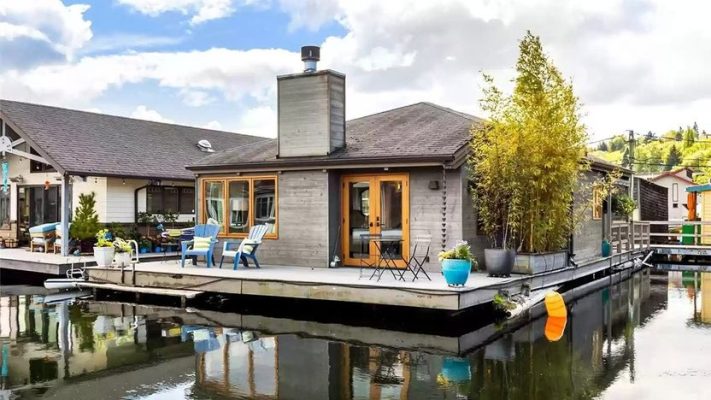
Sustainability and Floating Homes
A lot of new floating houses are made to be environmentally friendly. They often have eco-friendly features like solar panels, systems that collect rainwater, and tools that use less energy. You can leave less of a carbon footprint and live in peace with nature if you live in a floating home.
Additionally, environmentally friendly products and building techniques are frequently used in floating home construction. Some are made from recycled or long-lasting materials, which makes them even better for the earth. The design of these homes also takes natural light and air flow into account, so they don’t need as much artificial lighting and air cooling.
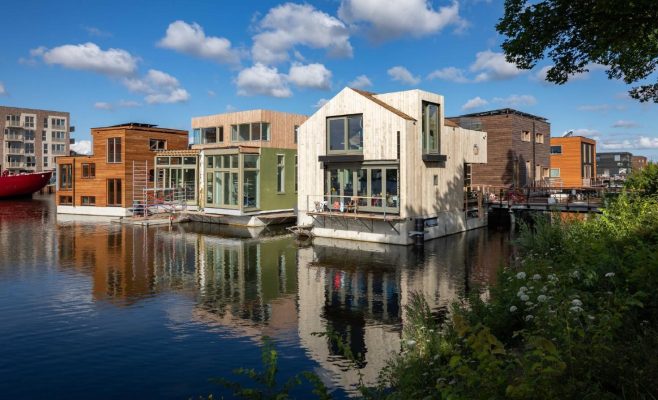
The Challenges of Living in a Floating Home
Living in a floating home can be great, but it can also be hard at times. One of them is maintenance; floating homes need regular care to keep them afloat and their structures strong. The sea climate can be harsh, and the saltwater and wetness can hurt things over time.
Additionally, getting a loan for a floating home may be harder than for a regular house because some lenders see them as a bigger risk. Because of the unique risks of living on water, insurance can also be more expensive and harder to get.
Another problem is that there isn’t much room. Some floating homes have a lot of room, while others are pretty small and need smart storage options and good use of space. For people who are used to living in bigger homes on land, this can be a big change.
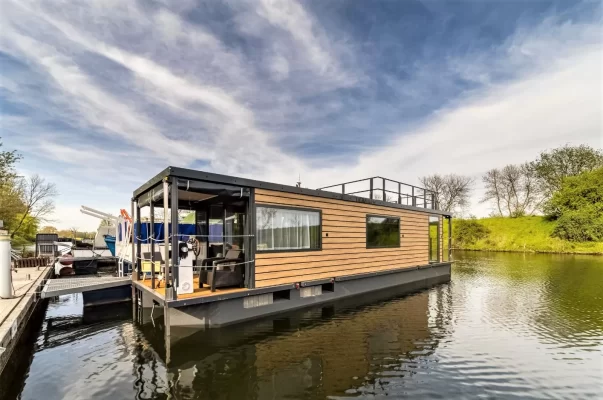
A Look at Floating Home Communities
From the cute waterways of Amsterdam to the beautiful coastlines of the Pacific Northwest, floating home villages can be found all over the world. There are a lot of different types of homes in these areas, from modern, high-tech ones to cute, rural cabins.
Another thing that comes with living in a floating home community is a strong sense of community and connection. People who live there often have similar hobbies and ways of life, which makes for strong social ties and a helpful environment. There are a lot of community events, gatherings, and activities that make life in these unique towns more social.
On top of that, these neighbourhoods are often found in places with amazing natural beauty. Right outside their door, residents can do water sports like sailing, paddleboarding, and swimming that aren’t possible anywhere else. It’s more than just a house; it’s a journey and a place to clear your mind.
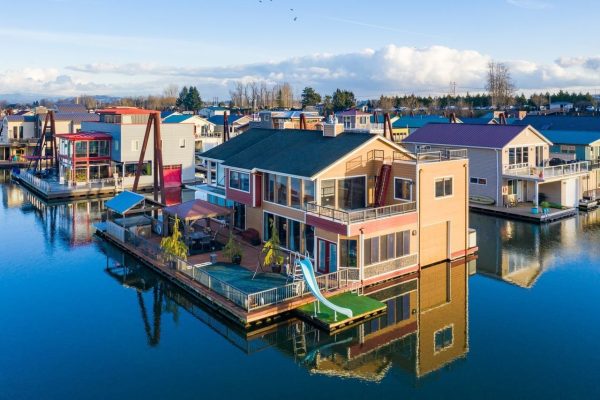
Comparing Floating Homes to Traditional Homes
| Feature | Floating Home | Traditional Home |
| Location | On water | On land |
| Mobility | Stationary | Fixed |
| Risk | Varies with water levels | Depends on location |
| Community | Often close-knit | Varies |
| Price | Can be high | Varies widely |
Are Floating Homes Safe?
Floating homes are usually safe because they are made to handle different types of water. They are firmly attached so they don’t float away, and they are made to rise and fall with the water level, which lowers the risk of flooding.
Safety, on the other hand, rests on regular care, good building, and following local rules. Also, people who live on water need to be aware of how the weather can change and the risks that come with living in water. If you take care of your floating home, it can be just as safe as a regular house.
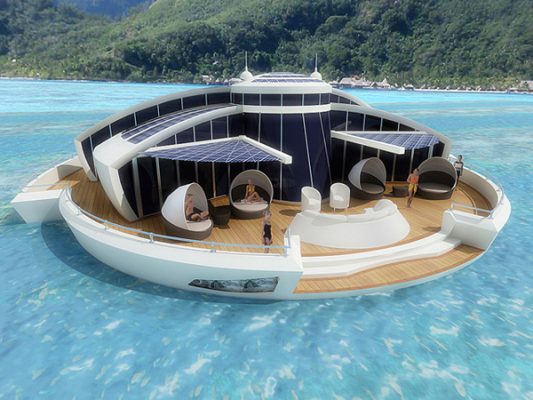
Are Floating Homes a Good Investment?
Putting money into floating homes can be profitable, especially in places where they’re hard to find or very popular. Their one-of-a-kind appeal often draws in a niche market, which could raise their selling value.
But the security of the market for floating homes depends on where you live and can be affected by things like zoning rules and climate change. People who want to spend should think about the housing market’s long-term trends and the local surroundings. As with any real estate purchase, it’s important to do your research.
Are Floating Homes Legal in Ontario?
Floating home construction is allowed in Ontario, but it is subject to certain zoning laws and rules that are different for each municipality. People who want to buy a home on the water should learn about the local building rules, environmental laws, and mooring rights.
Floating home construction may be prohibited in some places or require special permits. It is best to check with the local government and real estate professionals to make sure you are following all the laws and rules that apply.
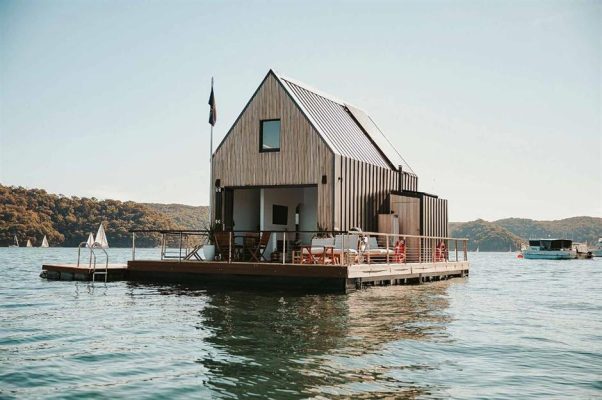
Are Floating Homes Expensive?
Floating home prices can be extremely variable. Location, size, style, and features are some of the things that affect price. Floating houses can be about the same price as regular homes in some places, but they can be much more expensive in other places because they are so special and hard to find. You should also think about the costs of mooring fees, repairs, and possibly higher insurance rates. People who want to buy should carefully look into all the costs involved.
How Are Floating Homes Built?
A floating home is built on a platform that floats on water. The platform’s base is usually made of concrete or pontoons so it can move. Building a house usually takes place on land first, then it is moved to water.
The mix between stability and buoyancy in these homes makes sure they stay level and safe. Modern building methods also focus on using less energy and lasting longer. Builders must follow certain building rules and standards that are appropriate for places where people live in water.
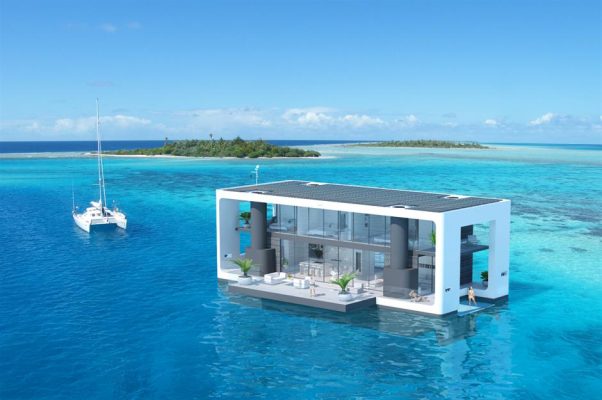
What Are Floating Homes Made Of?
Most floating homes are made of materials that are strong but not too heavy. The floating base is usually made of concrete, foam-filled pontoons, or a mix of the two.
This gives it stability. Most of the time, the framework is made of steel, wood, or a mix of the two to keep the weight and steadiness in check. There is a lot of glass in many floating houses so that they can get natural light and beautiful views. Building with eco-friendly and long-lasting materials is becoming more and more common.
Can Floating Homes Be Moved?
Floating homes can technically be moved even though they are meant to stay put. Moving a floating home, on the other hand, is hard, expensive, and needs special tools and knowledge. The house has to be taken away from its services and piers and then towed to a new location.
How easy it is to move a floating home and how much it costs depend on its size, shape, and how far it needs to be moved. Not many people do it, and it needs to be carefully planned.
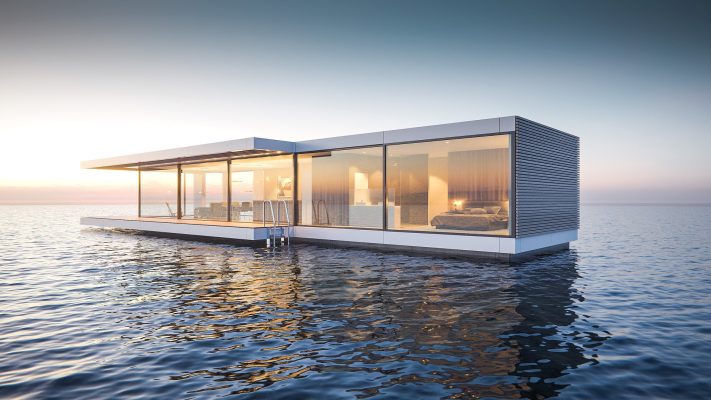
Do Floating Homes Pay Property Taxes?
Even though floating homes are taxed like regular houses, the way they are valued may be different. Depending on their worth and where they are located, floating home are charged like real estate in some places.
In some places, they might be charged like boats or other personal items. The details depend on the tax rules in the area and how the floating home is categorised. Owners should talk to their local tax officials to find out what the rules and rates are for taxes.
Final Thought
The beauty of nature and the comforts of modern life can be found together in floating homes, making them a truly unique and charming place to live. People who want to live on the water might love a floating home, but it might not be right for everyone. These islands are more than just a place to live. They’re a way of seeing the world that moves with the flow of the water and the seasons.





